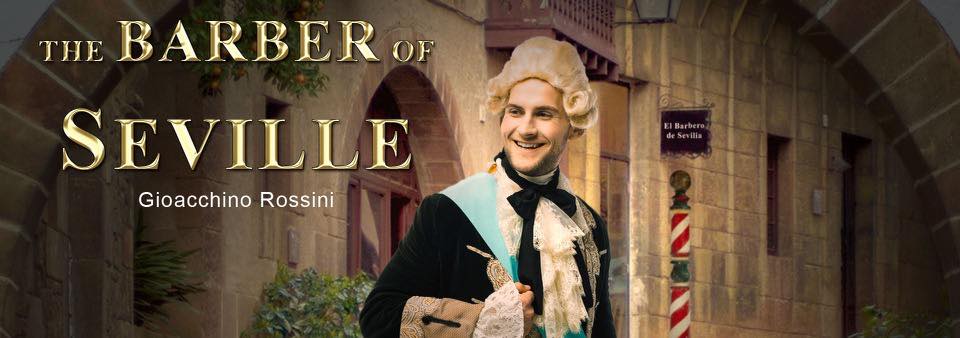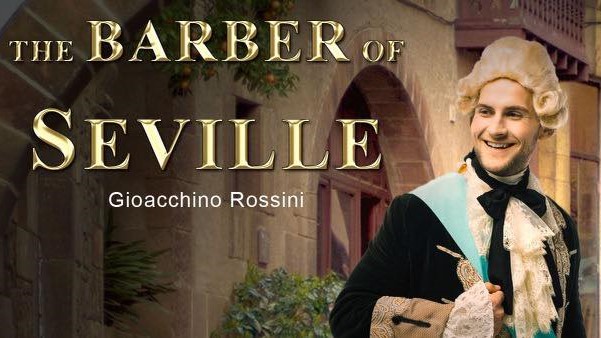TAYLORSVILLE — The Lyrical Opera Theater has been putting community opera on Utah stages since 2014. Unlike community theater where almost anyone can be onstage, however, it takes years of training to take on serious opera—so lead actors often have at least one or more college degrees.
The organization, which is not to be confused with Lyric Rep at USU, performs at the magnificent Mid-Valley Performing Arts Center. I recently overheard the staff of another performing arts organization wishing they had something like it near their headquarters in downtown Salt Lake. The space is wonderful, and certainly worth a visit.

Lyrical Opera Theater’s current production of The Barber of Seville is a good introduction to the classic opera for theater goers, and an affordable entry point to opera for the community. The classic 1816 opera by Gioachino Rossini with libretto by Cesare Sterbini takes place in Seville, Spain in the year 1775, where the dashing and good-looking Count Almaviva is looking to woo the beautiful young Rosina. They fall in love, but Rosina’s guardian, the evil Dr. Bartolo, won’t consent—because he plans to marry her himself and keep her dowry all to himself.
To get past Bartolo’s wicked designs, Almaviva (who’s name means “living soul” in Spanish) gets the help of the jovial town barber, Figaro—a popular and gregarious fellow who knows everyone in town, and is as handy with pulling schemes as he is with a razor.
Since this is a classic comedy, it goes without saying that the good guys eventually win the day, but only after it takes all of their wits and more than a few disguises to pull it off. Despite the disguises (which would only fool a comic villain), the plot is easy to follow, with entire song’s often devoted to expressing a single thought, such as “I like that woman,” “I like money,” and “I’m a handyman.”
For decades, many opera patrons’ first taste of Barber came not in the opera house, but The Rabbit of Seville, the 1950 Looney Toons picture with Bugs Bunny and Elmer Fudd—perhaps to more than a few opera purists’ chagrin. However, as far as cartoons go, this is rather lofty company, as it’s regarded as one of the greatest cartoons of all time. I was at a classic film festival at a movie house in Cambridge, Massachusetts, and when Rabbit started, the audience erupted in applause.
In Lyrical Opera Theater’s production, Christopher Clayton radiated stage presence as Figaro, and his rich baritone and technical singing ability were on full display in the classic “Largo al factotum.” Clayton’s line readings were dynamic and excellent throughout, and he was fabulous at acting in character, even when he was not speaking. Particularly enjoyable was when Clayton’s Figaro transitioned into “action mode” as the plot thickened (“Do you take me for a peasant barber?!”) and he became even more assertive to achieve his goals.
However, of all the leads, it’s Almaviva who gets the first chance to shine vocally with “Ecco, ridente in cielo.” Court Thomas as Almaviva displayed excellent control of his fast vibrato, with impressive power throughout the production. At one point, while pretending to be another character, Thomas altered his pitch even higher than his natural tenor, which was delightful. Thomas was strong in the role, although he did occasionally feel a little cool and detached; a little warmer expression may help. Overally, Clayton and Thomas’ diction and pronunciation were both outstanding, both in their singing and their spoken dialogue.
Daniel Tuutau as the evil Dr. Bartolo and Christopher Stockslager as his henchman Don Basilio performed some of the clearest and strongest acting of the evening. Stockslager displayed a powerful and impressive belting voice with his solo, “La Calunnia e venticello,” and his broad, almost cartoonish evilness was enjoyable.
Demaree Clayson Brown displayed outstanding vocal abilities as Rosina, and grasped the role’s high-flying pyrotechnical challenges. Brown earned praise from the audience on multiple occasions, including Rosina’s signature cavatina “Una voce poco fa,” where Rossini seemed to throw the kitchen sink at the part, with a wide array of jaw-dropping vocal gymnastics.
The fact that Rosina, the female lead, is written and performed by a mezzo-soprano is unusual for an opera. Lower than a soprano, the mezzo is usually reserved for secondary roles. But in Barber, Rosina establishes herself as a strong character early on, capable of snuffing out her nasty overlord herself, and the slightly lower range emphasizes her kick-butt nature.
Mezzo soprano Emily Anderson Mijarez played the old maid Berta, a put-upon servant struggling to keep up with the insanity happening in Bartolo’s home. While a small, supporting role, Mijarez earned some of the evening’s loudest applause for her number, “Il vecchiotto cerca moglie,” which she attacked with a powerful voice. Her little cough after singing how she’s going to die as an old maid was also quite funny.
The cost-effective sets included photo-printed fabric wrapped around scaffolding, and large projected images of Spanish streets circa 1816. Some tightening of the fabric, especially around Rosina’s window, may improve the look of the set. (Sound, scenery and staging are credited to Lyrical Opera Products, Inc., with no one named as director.) While most props did their role well, the key portrait of Bartolo was about 1/6th the frame, which made it difficult to see how Rosina was interacting with it.
As with most community productions, there were occasional technical issues; however, most didn’t occur more than once. Audio announcements were on the low side, and included one I’d never heard in a theater before: “Please feel free to take pictures and video during the performance and post them on social media.” Ah, the joys of performing copyright-free work. Actors were not adequately lighted while upstage, as well as on stage right (lighting was by Jack Dingman). Also, while the personal bios and information in the pre-performance slideshow were nice, some of the personal photos were off-putting.
Lyrical Opera Theater’s mission is to “bring opera to the masses,” and for a mere $15-30 ticket, they certainly succeeded. Thanks to spectacular singing and some good acting by the lead actors, their production of The Barber of Seville does just that. Plus, it concludes with a beautiful anthem to love—”Amor e fede eterna, si vegga in noi regnar!” or “May love and faith eternally be seen to reign in us.” May they indeed.
[box]Lyrical Opera Theater’s production of The Barber of Seville plays February 10, 14, and 16, 2024 at 7:00 PM and February 18, 2024 at 3:00 PM at the Mid-Valley Performing Arts Center (2525 W. Taylorsville Road, Taylorsville). Tickets are $15-30. Tickets are available through ArtTix. For more information, visit lyricaloperatheater.com.[/box]

